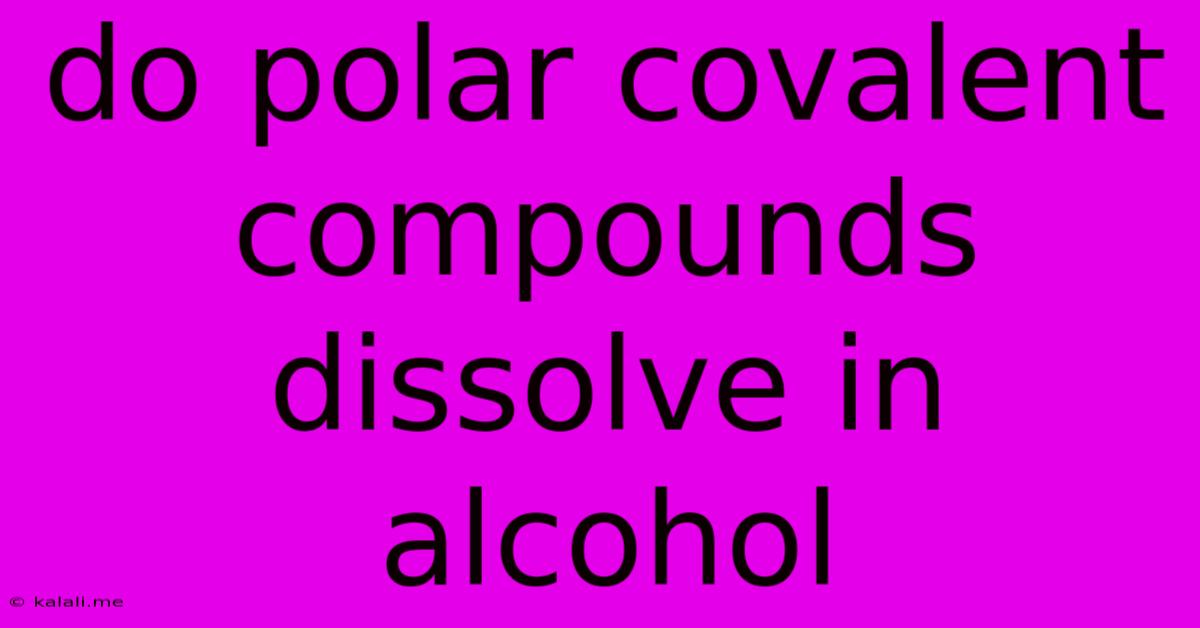Do Polar Covalent Compounds Dissolve In Alcohol
Kalali
Jun 03, 2025 · 3 min read

Table of Contents
Do Polar Covalent Compounds Dissolve in Alcohol? A Deep Dive into Solubility
Meta Description: Understanding the solubility of polar covalent compounds in alcohol requires examining polarity, hydrogen bonding, and the like dissolves like principle. This article explores these factors and provides examples.
Alcohols, such as ethanol and methanol, are known for their ability to dissolve a wide range of substances. But do they dissolve all polar covalent compounds? The answer, as with most things in chemistry, is a nuanced "it depends." Let's delve into the factors that determine the solubility of polar covalent compounds in alcohol.
Understanding Polarity and Solubility
The key to understanding solubility lies in the principle of "like dissolves like." This means that polar solvents, like alcohols, tend to dissolve polar solutes, while nonpolar solvents dissolve nonpolar solutes. Polar covalent compounds possess a significant difference in electronegativity between the atoms forming the bonds, leading to a partial positive charge (δ+) on one atom and a partial negative charge (δ-) on another. This uneven distribution of charge creates a dipole moment.
Alcohols, thanks to their hydroxyl group (-OH), are polar molecules themselves. The oxygen atom is significantly more electronegative than the hydrogen atom, creating a polar bond. This polarity, combined with the ability of the hydroxyl group to participate in hydrogen bonding, makes alcohols effective solvents for many polar covalent compounds.
The Role of Hydrogen Bonding
Hydrogen bonding is a special type of intermolecular force that occurs when a hydrogen atom bonded to a highly electronegative atom (like oxygen or nitrogen) is attracted to another electronegative atom in a different molecule. This strong intermolecular force significantly impacts solubility.
Because alcohols can both donate and accept hydrogen bonds (due to the -OH group), they readily interact with other molecules capable of hydrogen bonding. Therefore, polar covalent compounds that can also participate in hydrogen bonding, such as sugars and carboxylic acids, are particularly soluble in alcohols.
Factors Affecting Solubility
While the "like dissolves like" rule is a good starting point, several factors influence the solubility of a polar covalent compound in alcohol:
-
Strength of Polarity: The greater the polarity of the compound, the more likely it is to dissolve in alcohol. Highly polar compounds will have stronger interactions with the alcohol molecules.
-
Molecular Size and Shape: Larger molecules, even if polar, may have reduced solubility due to the increased influence of weaker intermolecular forces like van der Waals forces, which can compete with the polar interactions. Similarly, complex molecular shapes can hinder interactions with the alcohol solvent.
-
Presence of Nonpolar Regions: If a polar covalent compound contains significant nonpolar regions (hydrocarbon chains, for example), its solubility in alcohol might be decreased. The nonpolar parts will have limited interaction with the polar alcohol molecules.
Examples
-
Sugars (e.g., glucose, sucrose): These are highly soluble in alcohol due to their numerous hydroxyl groups, allowing for extensive hydrogen bonding.
-
Carboxylic acids (e.g., acetic acid): The carboxyl group (-COOH) allows for strong hydrogen bonding interactions with alcohol molecules, resulting in good solubility.
-
Amino acids: The presence of both polar amino (-NH2) and carboxyl groups enables interaction with alcohol solvents through hydrogen bonding. However, the specific solubility will depend on the side chain's properties.
-
Some ketones and aldehydes: While polar, the solubility of ketones and aldehydes in alcohol may vary depending on the size and structure of the molecule. Larger molecules with long hydrocarbon chains might exhibit lower solubility.
Conclusion
In summary, while many polar covalent compounds dissolve readily in alcohol, solubility isn't guaranteed. The strength of polarity, the ability to participate in hydrogen bonding, molecular size and shape, and the presence of nonpolar regions all play crucial roles. Understanding these factors provides a more complete picture of why some polar covalent compounds dissolve well in alcohol while others do not. The "like dissolves like" principle remains a useful guideline, but a more detailed analysis is often necessary for precise predictions.
Latest Posts
Latest Posts
-
How To Fix Ripped Paint On Drywall
Jun 05, 2025
-
How Long Will A Sump Pump Last
Jun 05, 2025
-
How To Get Paint Off Wood Floor
Jun 05, 2025
-
How To Get Permanent Marker Off Wood Without Alcohol
Jun 05, 2025
-
Db Doesnt Show In Management Studio
Jun 05, 2025
Related Post
Thank you for visiting our website which covers about Do Polar Covalent Compounds Dissolve In Alcohol . We hope the information provided has been useful to you. Feel free to contact us if you have any questions or need further assistance. See you next time and don't miss to bookmark.